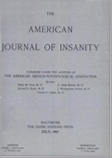THE SUPRARENAL CORTEX AND BLOOD CHOLESTEROL IN DEMENTIA PRÆCOX
Abstract
That some disturbance of lipoid metabolism may occur in dementia præcox and may involve the suprarenal cortex, has been suggested by the following: (a) Previous observations on the sexual development and behavior of these patients. (b) The evidence that the suprarenal cortex is involved in these disturbances of sexual development. (c) The evidence that the suprarenal has both an embryologic and functional relation to the gonads on the one hand and to the brain on the other. (d) Substances of a lipoid nature play an essential part in the functional metabolism of each of these organs. (e) The female sex hormone and the vitamine for reproduction are both of a lipoid nature. (f) The low basal metabolic rate frequently observed in dementia præcox suggests an involvement of the suprarenal. The evidence for these considerations is reviewed. The significance of cholesterol is discussed.
Blood cholesterol determinations, by the Bloor method, are reported on 40 patients with dementia præcox and on 27 with other psychoses. In 16 males with dementia præcox classed as deteriorated the average for the blood cholesterol was 118.3 mg. per 100 c. c., while for 11 similar females it was 144.6 mg. In 5 males recently admitted and selected as representing the acute excited phase of dementia præcox, the average was 104.6 mg. In 6 males without deterioration it was 176.6 mg. In 6 males with other functional psychoses not in acute phase 149.2 mg. In 13 males with general paralysis 167.3 mg. In 6 females classed as manicdepressive 162.7 mg.
Other possible causes of a low blood cholesterol were eliminated. Four patients were given extra diet including 4 eggs daily with no persistent increase in the blood cholesterol. Two of them were also fed 1 gm. cholesterol daily with the same result.
The results seem to show that in many patients with dementia præcox the blood cholesterol is unusually low, and that it may be more directly correlated with the psychosis and with sex than with any other recognized factors. That some correlation with sex seems to exist is considered significant and in accord with the considerations which suggested the work.
Access content
To read the fulltext, please use one of the options below to sign in or purchase access.- Personal login
- Institutional Login
- Sign in via OpenAthens
- Register for access
-
Please login/register if you wish to pair your device and check access availability.
Not a subscriber?
PsychiatryOnline subscription options offer access to the DSM-5 library, books, journals, CME, and patient resources. This all-in-one virtual library provides psychiatrists and mental health professionals with key resources for diagnosis, treatment, research, and professional development.
Need more help? PsychiatryOnline Customer Service may be reached by emailing [email protected] or by calling 800-368-5777 (in the U.S.) or 703-907-7322 (outside the U.S.).



